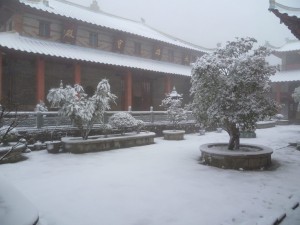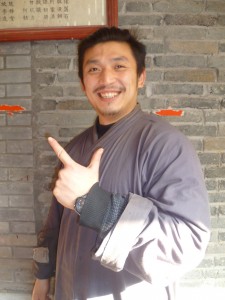A Chan Buddhist (Zen) Meditation Retreat or Chan Qi
49 Day pilgrimage/retreat report December 2013 – February 2014
禅七法会真如禅寺南唱江西中国
Copyright Yan Li 2014
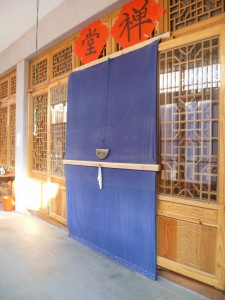
The new temporary Chan Hall.
I had an invitation to attend a 49 day Chan (Zen) retreat in the Wei Liang style developed by the late Grand Master Empty Cloud at True Suchness Chan Monastery or Zhen Ru Chan Si near Nanchang, Jiangxi province in China. On the morning of Wednesday 4th December we held an opening ceremony and chanted the great compassion mantra many times whilst walking around the monastery, purifying the place in preparation for the work ahead. That afternoon we all crowded into the Eastern Chan hall at 4pm. There the senior monks were allocated their wooden swords or incense boards and various posts or ranks. Around a hundred of us then went to use the large new hall and around another hundred people used the Eastern Chan hall for the next 49 days. The Western Chan hall had mysteriously burnt down three months earlier, along with the abbot’s hall. The rebuilding work had already started with money pledged from Taiwan and the ground work was complete by the end of the retreat, with many thousands of grey bricks in high piles around the monastery grounds in preparation. The central government had also kindly pledged a fire fighting system to protect the monastic national treasure, the main hall built by Master Empty Cloud in the 1950s. We began at 6pm and it was instantly intense; we ran and were chased around the central dais with shouting, cajoling and taps from the incense boards. After 20 minutes the signal was given and we went to sit on our allocated seats, the Xu Deng or meditation benches. We ran and sat continually until nearly midnight. There were three short talks including one from the Abbot Chan Master Chen Wen. Also, at 7.10 every evening, we had supper; plentiful steamed buns stuffed with vegetables were served at our seats. Tea was brought around often in the afternoon and evening and reviving fresh hot soya milk was served at around 9pm. We were all exhausted after the first non-stop six hours of effort. The next morning we began again at 4.45 am, and then we were served thin slices of ginger and salt in hot water to start the day. It wasn’t long before I started to hallucinate strongly. The floor was undulating and I could see flashing lights. Knowing this to be a false state I simply ignored it and carried on undeterred. We were all mangled through and beyond barriers of pain, endurance and humiliation throughout the day. After two weeks it started to become normal and ordinary. However there was a very warm sense of humanity and caring support underlying the retreat: all of us on our common quest for higher self-knowledge and spiritual improvement. My friend, Chan Master Guang San, had the very difficult job of disciplinarian; he flies through the air during the running, keeping everybody in the right place. He administers three blows if you snore or lean back on the wall whilst sitting. He has to follow many other complex rules fairly and accurately using his sense of compassion and wisdom. He was there to help us all. Hardly anyone, unless they knew him, could understand his strong Cantonese accent. The instruction talks were mostly too complicated for my Mandarin; some were spoken in other very strong accents that even had the Chinese themselves guessing as to what was being said.
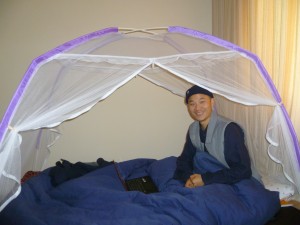
Master He Dong
My roommate was my old friend Chan Master He Dong. He had originally told me about the possibility that I could go on the retreat. He helped me by writing a letter of invitation so I could get the 90 day visa to attend. He was also a great help with translating and explaining to me how to survive the retreat. ‘You just worry about yourself,’ he told me. ‘Don’t let anybody else affect or infect you, just be like the dead guy.’ (Don’t react to anything, just put reactivity aside and let go of the ego). Chan Master He Dong is by nature a night owl, up all night and would often get some sleep in the day time. He told me the next morning that Master Gwan San, the disciplinarian, came in and gently struck him in bed whilst he was asleep. He Dong had the vital and important job of being the cook in the small snack kitchen outside our meditation hall. There he brewed teas, cooked soya milk, seven treasures porridge and many other tasty nutritious snacks, including bananas and other fruit soaked in boiling water to warm them. He was also always kindly and made sure that I had a supply of biscuits and nice tea in our room right through the retreat. He was my constant support and interpreter. In exchange, I gave him English Dharma phrases to learn. He has a strong and quick memory and thirst for Buddhist knowledge. Although still young at 31, he could easily answer any question on Chan Buddhism for me. On the third day of each week most guys went for interviews. I never went as I had no questions, but it meant we finished the afternoon session one hour early so I could get a bucket wash and rinse out my underwear. There was almost no leisure time on this retreat and no days off. You just worked non-stop at the practice. I soon developed problems with my feet from running on the hard floor, including blisters, one of which went septic. I had to stop running and hobble around the outside slow lane with the old guys and those with hip, knee or foot problems. One night I awoke to what sounded like the builders starting work at 2am! I discovered it was the wind, so no wonder all the doors had big rocks next to them. I moved a rock against our door to stop it banging in the wind, but there were so many doors in the monastery and the noise was quite incredible and there was nothing further I could do to stop the banging. So that’s why Master Empty Cloud had metal tiles put on the roofs there so you could nail them down and stop them blowing off in the strong winds. Tuesday, 10th December. Today is the last day of week one. When I got up it was beautiful and frosty outside. Time had passed quickly, and we were all settling into the long and complicated rules and the formidable and daunting timetable of the retreat. This style of Chan retreat was originally devised by Master Bai Chang. The third emperor of the Ch’ing Dynasty reworked it and lastly Master Empty Cloud made some changes. It is practised in this form today in only four major Chan Monasteries in mainland China: Zhen Ru Chan Si near Nanchang; Yun Men Chan Si in Guangzhou; Gao Min Chan Si in Yangzhou and O Long Chan Si in Xi’ an. The total number of participants involved is less than 1,000. A few other monasteries in China follow less austere rules, often for shorter periods, but Po Lam Chan monastery in Hong Kong has a similar version lasting for ten weeks every winter.
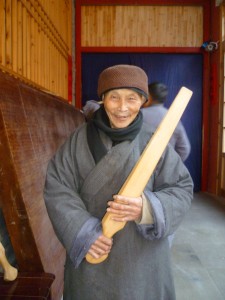
The wonderful old monk in charge of the Empty Cloud Memorial hall.
Back on this retreat, no one can shave – the monks all grow their hair and beards. Nor can you get a hot shower during the retreat; you are only able to wash with a bowl or bucket of water. There is no heating. All chanting and ceremony is suspended except for the short meal chant. Even prostrations are put aside until the end of each week session when there are just three. There is only time for Chan practice. But these retreats are not silent and people come and go during the 49 days. There are 18 running and sitting periods every day and it is relentless, demanding and testing in a way that is well beyond ordinary levels of endurance. But underlying the mental and physical torture and insanity of the retreat is a peaceful pure land, free of greed, hate and delusion and also free of the burden of self with all of its reactivity. That is a free and natural state of mind; something that is quite beyond the expectations or experience of most people. This is Chan. At the end of the evening we finished the last day of week one early at 9pm, but the rules were so complicated that they forgot some of the closing ritual and had to come back into the hall to finish it. I went straight to bed – most nights you got only four and a half hours. I soon got used to that and it was never a problem getting up even when Master He Dong and myself had talked about the practice and the tradition very late into the night and slept for only a couple of hours. During the second week the pressure became much more intense. I noticed the Abbot having strong words with several monks. The running was faster. Both shouting and striking (with the incense board) were more frequent (these are the training characteristics of the five Chinese Chan schools). We were reprimanded for everything and many had to kneel in repentance in front of the Buddha statue. I was struck three times for walking the wrong way in front of the Buddha. We all gave our last drop of energy during that week and more, using the support of our collective determination. The next day after lunch I jogged to the nearby small village store just outside the monastery grounds. I bought a new pair of cloth shoes as mine were too tight and were making my feet sore. I heard there that one of the village dogs I knew had disappeared suddenly; they thought that somebody had stolen him to eat. With my new shoes I rejoined the fast running sessions. I had developed new muscles and was enjoying it. Coughs and colds spread like wild fire and the spittoons outside the Chan hall were soon filled. They boiled black vinegar at the back of the hall to purify the air from the bacteria. It made my throat sore. It was ‘interview day’ again. I still had no questions and so used the time for a wash and a short walk to the Empty Cloud memorial hall. It started snowing which lasted only for one week that winter. I was sleeping with my hat on in bed with a hot water bottle thoughtfully packed in my suitcase together with some new thermal underwear, bought for me by my considerate and supportive girlfriend who also kindly looked after all my affairs whilst I was away so I could attend the retreat. Without her support and that of Chan Master He Dong, my roommate, I could not have attended.
By December 10th I noticed I felt very light and comfortable and as agile as a cat. It was such a joy to be alive. Everybody was throwing all of their energy into the retreat. There was a bright three quarter moon I saw on my way back to my room that night. On the 21st I found I was holding the Hua Tao (mind before thought) more easily and for longer periods. It was interview day again and I still had no questions. I knew the state of mind before thought and knew how to doubt and look into it. That was why I was there, to see right through my self-delusion. It was too cold to venture outside. Icicles hung from the eves. Mr Wang – Christmas Eve. He was a tall, gormless-looking giant of a man with large bags hanging under his eyes who spoke in a high squeaky voice. He had just turned up a couple of days earlier and then he came straight over and sat next to me for the meditation periods. He shuffled and gazed around constantly, he flapped his arms seemingly involuntarily. He broke the shallow Samadhi I had achieved. He started to annoy me. I asked him to stop it but he just held his thumb up to me in admiration and pointed to my legs in full lotus approvingly. I tried demonstrating to him how to sit properly with composure but this had no effect whatsoever. It was obvious he had never sat before and when I asked him what he was messing around at he told me it hurt. When the patrol came by with the wooden sword, he quickly sat up straight and then slumped as soon as he passed. Master He Dong and I wondered why the guest master had not screened him before such a retreat.
